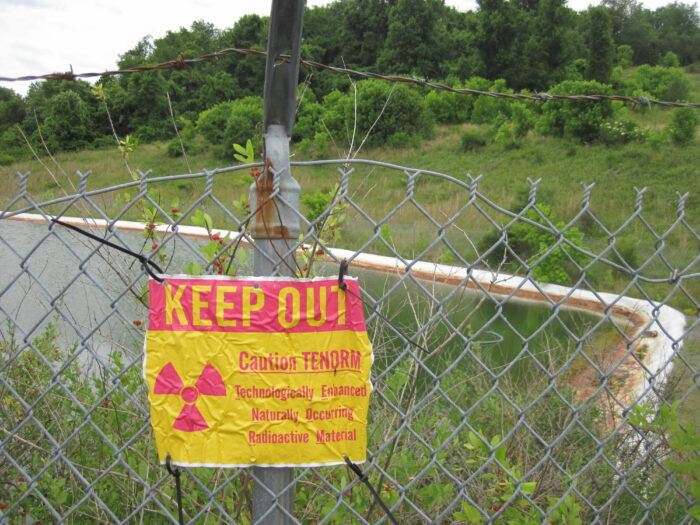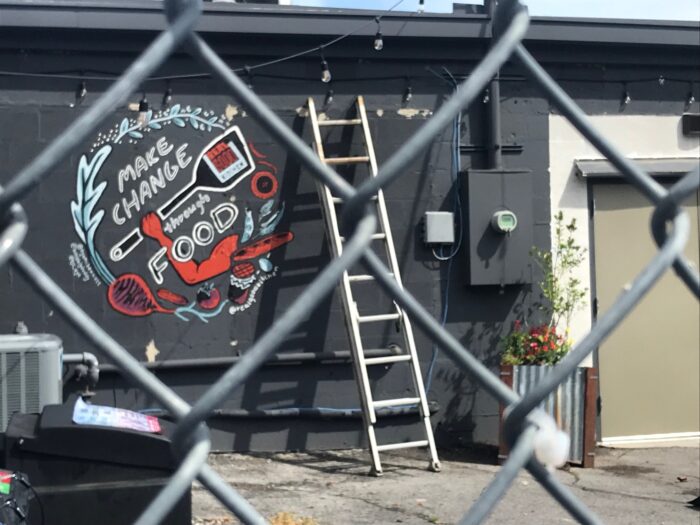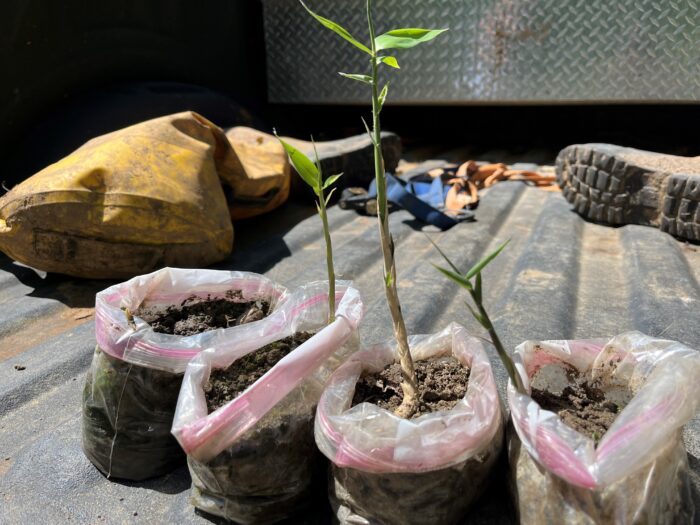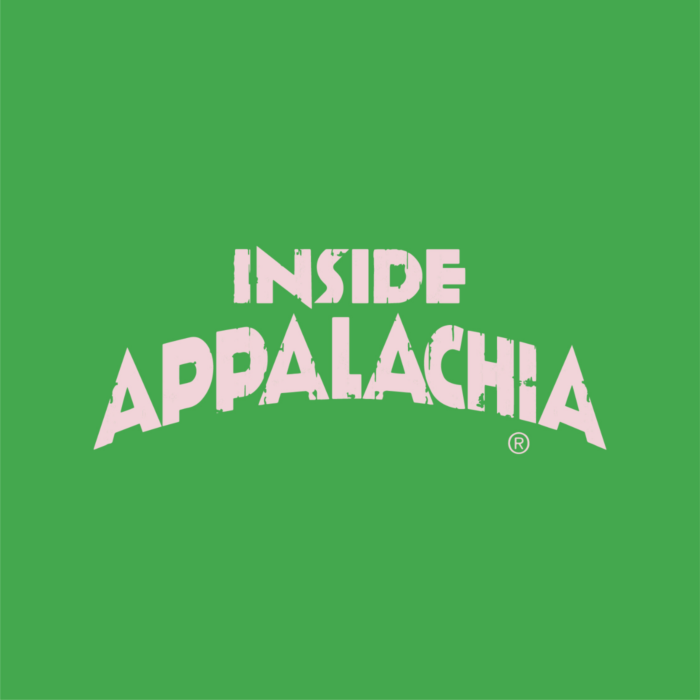انتقل إلى وضع عدم الاتصال باستخدام تطبيق Player FM !
Looking Back At 2024, Inside Appalachia
Manage episode 457834431 series 2471658
This week, a look back at some of the stories that shaped the show in 2024, like the story of an abandoned Fairmont Brine site in Marion County, West Virginia. It was a common hangout spot, but there’s a hidden danger.
Also, food deserts are places where it’s hard to find nutritious food. Like disenfranchised neighborhoods in East Knoxville, Tennessee.
And, not all bamboo is invasive. In fact, there’s a species native to Appalachia.
You'll hear these stories and more this week, Inside Appalachia.
In This Episode:
- Radioactivity At Fairmont Brine
- Healing Damaged Communities Through Food
- Appalachian Bamboo Bouncing Back
Radioactivity At Fairmont Brine

Photo Credit: Justin Nobel
Starting in the late 2000s, fracking brought a natural gas boom to parts of Appalachia. But, the natural gas market has been erratic. And in some places, the oil and gas industry has left behind dangerous, radioactive sites. Justin Nobel is an investigative reporter who’s covered that issue.
In the fall of 2023, he wrote about it for Truthdig in a story titled “Inside West Virginia’s Chernobyl: A highly radioactive oil and gas facility has become a party spot in Marion County.” Mason Adams spoke with Nobel.
Healing Damaged Communities Through Food

Photo Credit: Wendy Welch/West Virginia Public Broadcasting
Through the 20th century, lots of poor and largely Black neighborhoods were bulldozed and replaced with new highways and civic centers. Now some groups are looking at creative ways to repair those communities. In April, we featured a story about a neighborhood in Knoxville, Tennessee. And a woman there who uses food as a way to heal generations of damage.
Folkways Reporter Wendy Welch had the story.
Appalachian Bamboo Bouncing Back

Photo Credit: Roxy Todd/Radio IQ
There are a lot of different kinds of bamboo – more than 1,400 varieties.
America has a native species of bamboo, but was nearly wiped out.
Last summer, Radio IQ’s Roxy Todd reported that a group of mostly volunteers is trying to restore the plant in southwestern Virginia.
------
Our theme music is by Matt Jackfert. Other music this week was provided by Kaia Kater, Bob Thompson, Caleb Caudle, Noam Pikelny and Blue Dot Sessions.
Bill Lynch is our producer. Zander Aloi is our associate producer. Our executive producer is Eric Douglas. Kelley Libby is our editor. Our audio mixer is Patrick Stephens. We had help this week from folkways editor Nicole Musgrave.
You can send us an email: InsideAppalachia@wvpublic.org.
You can find us on Instagram, Threads and Twitter @InAppalachia. Or here on Facebook.
Inside Appalachia is a production of West Virginia Public Broadcasting.

107 حلقات
Looking Back At 2024, Inside Appalachia
Podcast - Inside Appalachia Story Archives - West Virginia Public Broadcasting
Manage episode 457834431 series 2471658
This week, a look back at some of the stories that shaped the show in 2024, like the story of an abandoned Fairmont Brine site in Marion County, West Virginia. It was a common hangout spot, but there’s a hidden danger.
Also, food deserts are places where it’s hard to find nutritious food. Like disenfranchised neighborhoods in East Knoxville, Tennessee.
And, not all bamboo is invasive. In fact, there’s a species native to Appalachia.
You'll hear these stories and more this week, Inside Appalachia.
In This Episode:
- Radioactivity At Fairmont Brine
- Healing Damaged Communities Through Food
- Appalachian Bamboo Bouncing Back
Radioactivity At Fairmont Brine

Photo Credit: Justin Nobel
Starting in the late 2000s, fracking brought a natural gas boom to parts of Appalachia. But, the natural gas market has been erratic. And in some places, the oil and gas industry has left behind dangerous, radioactive sites. Justin Nobel is an investigative reporter who’s covered that issue.
In the fall of 2023, he wrote about it for Truthdig in a story titled “Inside West Virginia’s Chernobyl: A highly radioactive oil and gas facility has become a party spot in Marion County.” Mason Adams spoke with Nobel.
Healing Damaged Communities Through Food

Photo Credit: Wendy Welch/West Virginia Public Broadcasting
Through the 20th century, lots of poor and largely Black neighborhoods were bulldozed and replaced with new highways and civic centers. Now some groups are looking at creative ways to repair those communities. In April, we featured a story about a neighborhood in Knoxville, Tennessee. And a woman there who uses food as a way to heal generations of damage.
Folkways Reporter Wendy Welch had the story.
Appalachian Bamboo Bouncing Back

Photo Credit: Roxy Todd/Radio IQ
There are a lot of different kinds of bamboo – more than 1,400 varieties.
America has a native species of bamboo, but was nearly wiped out.
Last summer, Radio IQ’s Roxy Todd reported that a group of mostly volunteers is trying to restore the plant in southwestern Virginia.
------
Our theme music is by Matt Jackfert. Other music this week was provided by Kaia Kater, Bob Thompson, Caleb Caudle, Noam Pikelny and Blue Dot Sessions.
Bill Lynch is our producer. Zander Aloi is our associate producer. Our executive producer is Eric Douglas. Kelley Libby is our editor. Our audio mixer is Patrick Stephens. We had help this week from folkways editor Nicole Musgrave.
You can send us an email: InsideAppalachia@wvpublic.org.
You can find us on Instagram, Threads and Twitter @InAppalachia. Or here on Facebook.
Inside Appalachia is a production of West Virginia Public Broadcasting.

107 حلقات
כל הפרקים
×مرحبًا بك في مشغل أف ام!
يقوم برنامج مشغل أف أم بمسح الويب للحصول على بودكاست عالية الجودة لتستمتع بها الآن. إنه أفضل تطبيق بودكاست ويعمل على أجهزة اندرويد والأيفون والويب. قم بالتسجيل لمزامنة الاشتراكات عبر الأجهزة.




